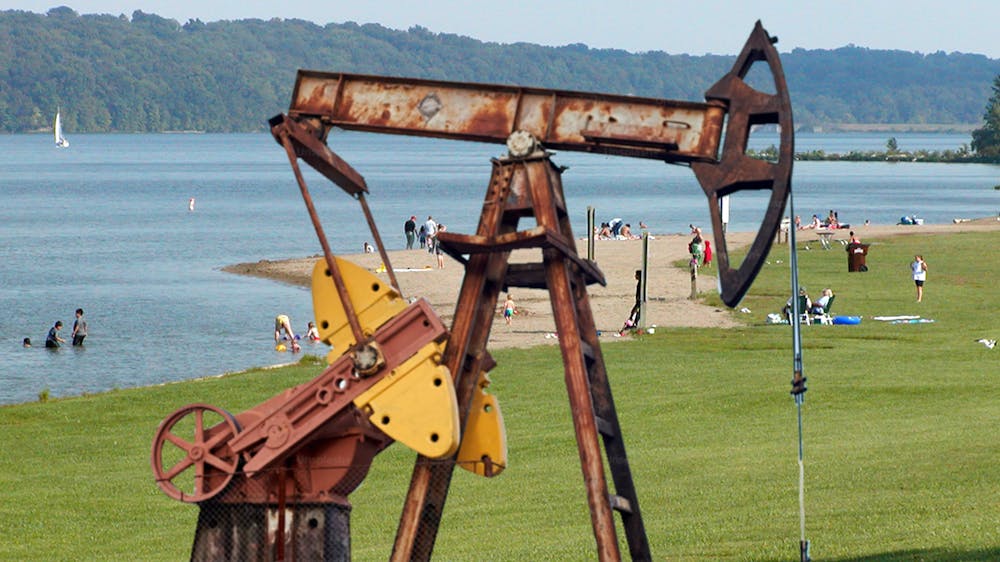With much of the recent political focus in the past few weeks centered around the highly controversial Ohio Senate Bill 83, another contentious new state bill has been brought forward that takes more power away from the people.
Ohio House Bill (H.B.) 507 was due to be put into effect on April 7, but was temporarily halted and has yet to be signed into law. This bill takes away many of the measures in place that allowed state parks and the citizens they serve to push back against oil fracking on public land, making it much easier for oil companies to set up operations in state parks.
Having first learned about this bill in my IES 275: Principles of Environmental Science class the week of April 19, I was reminded once more of it this past Saturday, while at Earth Fest in Oxford’s Memorial Park. People were handing out flyers with information about the bill, as well as a petition urging Governor Mike DeWine to reverse his decision, bringing up that he promised to “... continu[e his] administration’s policy of prohibiting any new surface use access in our state parks."
Despite this statement, the bill requires state parks to lease land to fracking companies that are registered with the Ohio Department of Natural Resources. Deemed unconstitutional by many environmental advocates, these groups are suing the state of Ohio for improper legal processes that led up to the creation of the bill.
Having started off as a bill regarding poultry regulations, the information about fracking requirements on state lands was added later and isn’t explicitly mentioned in the bill's name, which is part of what the environmental groups are suing about.
Imagine wishing to take the afternoon and go to Hueston Woods for a hike, only for the natural scenery and peaceful quiet provided by protected forests to be interrupted by fracking pads, pipelines and new roads tearing through the serenity. State parks are protected for a reason, given to the public as an avenue of recreation and escape from the hassles of everyday life, and should not be for sale.
Along with the aesthetic troubles, underground hydraulic fracking poses other risks. These include a tremendous amount of water used in the wells drawn from precious freshwater sources, polluted wastewater after the process is over, methane emissions, the possibility of chemical spills and other ecological damages that comes from building oil wells.
Moreover, H.B. 507 would classify methane, a natural gas, as “green energy.” Although it is cleaner and more efficient than energy sources such as coal and oil, methane has no business being classified this way.
The term itself is muddied because what makes something “green” is up to interpretation. What the U.S. should be doing is investing in renewable energies and reducing our dependence on unsustainable, non-renewable energy sources. H.B. 507 would therefore put Ohio behind in the sustainable energy circuit despite being above average in carbon dioxide emissions per capita.
Legal conundrums aside, what makes this bill and those such as S.B. 83 and H.B. 458 so dangerous is that it takes away the democratic power of the people. Decisions are being made behind closed doors by a small group of people while ignoring the democratically granted right of the people to have a say in government.
Public outrage is being largely ignored, and this is not healthy for a functioning democracy. America’s descent into fascism is a reality that some claim is bound to happen, while others believe that the people and system of government would never allow that to happen. No matter your opinion on this issue, all who are against the government overstepping its bounds should be worried about these bills.
The accessibility and purity of natural places needs to be preserved in our state. State parks are incredibly important in preserving natural environments that have been largely destroyed by human activity in Ohio. Petitions and letters to representatives are good ways to push back against legislation.
Enjoy what you're reading?
Signup for our newsletter
This bill would be a step backward, and it is imperative to take action against it.
Sam Norton is a sophomore biology major with an environmental science co-major and journalism minor. He has been writing for The Miami Student Opinion section and magazine since the fall of 2021 and was awarded an SPJ Mark of Excellence award for opinion writing.




